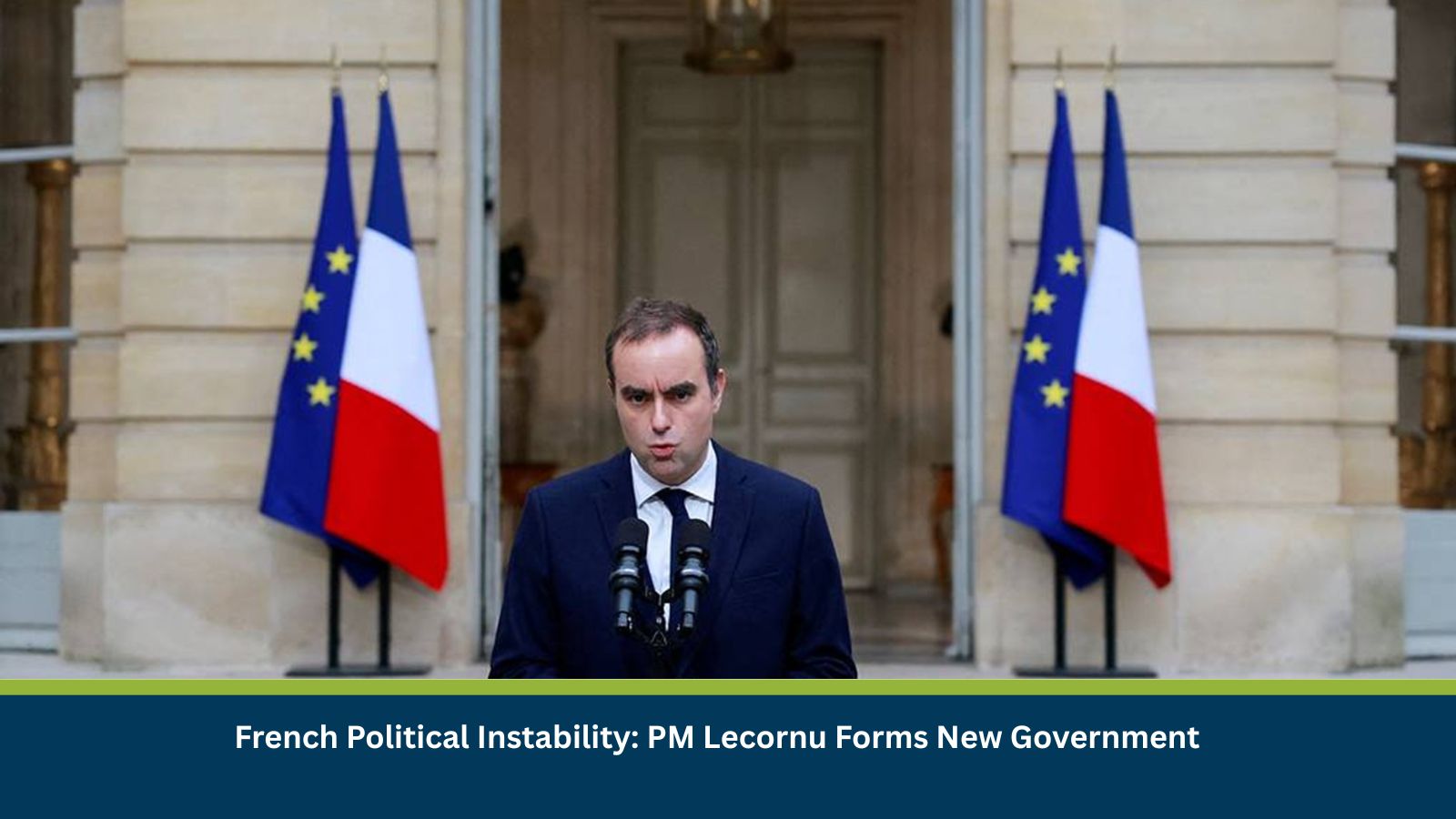Reappointment of Prime Minister Lecornu
On 12 October, newly re-appointed French Prime Minister Sébastien Lecornu unveiled a new government amid growing pressure to finalize the 2026 budget before the 15 October constitutional deadline. This marks Lecornu’s second attempt to form a government following his resignation on 06 October, after a no-confidence vote was passed against his previous administration.
The new Cabinet includes several members who have served in earlier governments aligned with President Emmanuel Macron, alongside a few from other political parties. Roland Lescure has been appointed Finance Minister, signaling continuity in fiscal management.
The government is scheduled to meet on 14 October to finalize the draft budget. However, Lecornu faces the immediate challenge of building cross-party support to prevent another collapse and stabilize ongoing French political instability.
Political Background
Since 2022, France has experienced prolonged political instability, primarily due to the loss of the legislative majority by President Macron’s party. The snap elections of 2024 produced a hung parliament, resulting in a minority government that has struggled to pass major reforms.
Successive prime ministers have resigned following no-confidence votes, mainly over budgetary disputes. This cycle of short-lived governments has hindered policy implementation and slowed economic reform efforts. The continuing French political instability has also strained the economy, which is projected to record a deficit of 5.4 percent of GDP in 2025.
Immediate Challenges and Political Divides
The newly formed Lecornu government faces a deeply divided parliament. The Rassemblement National (RN), led by Marine Le Pen, has already announced plans to table a parliamentary motion against the prime minister on 13 October, calling for fresh elections.
The France Unbowed (LFI) party has also declared that it will vote against the government and continue to demand President Macron’s resignation. Together, RN and LFI hold more than one-third of the seats in the lower house, posing a serious obstacle to Lecornu’s legislative agenda.
The Socialist Party (PS) has made its support conditional on removing Macron’s pension reform from the budget, a reform that raises the retirement age from 62 to 64. However, if this demand is met, it could alienate the Les Républicains (LR), who support the reform and have already announced the expulsion of six members who joined Lecornu’s cabinet.
Amid these competing interests, Lecornu’s ability to maintain parliamentary backing remains uncertain, further fueling French political instability.
Budgetary Implications and Outlook
The government aims to present a draft of the 2026 budget to parliament this week. If the draft proceeds through both houses without major amendments, it could be implemented by year-end, following the mandatory 70-day negotiation period.
However, persistent opposition could trigger another no-confidence vote, potentially forcing Lecornu to resign again. In such a scenario, President Macron’s administration may fail to meet the constitutional budget deadline, compelling lawmakers to adopt emergency stopgap legislation to authorize public spending, taxation, and borrowing from 1 January 2026.
While this measure would prevent a government shutdown, it would limit fiscal flexibility and heighten investor concerns about the durability of France’s governance framework.
Should another government dissolution occur, early legislative elections could follow, leaving insufficient time in December to enact interim measures. This could prolong French political instability and undermine efforts to restore market confidence.
Implications for Governance and Stability
The uncertainty surrounding Lecornu’s new administration poses short-term political and economic risks. Repeated budget delays, potential parliamentary gridlock, and the threat of early elections may deter foreign investment and disrupt policy continuity.
Moreover, persistent domestic divisions could lead to public discontent, nationwide protests, or strikes, particularly around contentious issues like pension reform and fiscal austerity. The government’s ability to manage such unrest will be critical to maintaining stability during this sensitive period.
Recommendations
- Monitor developments related to France’s 2026 budget discussions and parliamentary sessions.
- Organizations and investors should prepare for potential strikes, policy delays, and currency fluctuations linked to political uncertainty.
- Travelers and businesses operating in France are advised to track official advisories and avoid areas near potential demonstrations.
Conclusion
The reappointment of Prime Minister Sébastien Lecornu reflects ongoing attempts to stabilize France’s fragile political landscape. Yet, the deep divisions among political parties and the continued struggle over the national budget highlight the entrenched nature of French political instability.
Whether Lecornu can navigate this complex environment and pass the 2026 budget will determine not only the survival of his government but also France’s fiscal and political trajectory in the coming year.
Stay Ahead of Threats with Datasurfr Predict
MitKat’s Datasurfr Predict delivers accurate, real-time, and contextualised data to help organisations respond swiftly to physical, environmental, and cyber threats.
With Sam AI, our AI Agent not only provides context for unfolding events but also analyses vetted historical data to forecast how events are likely to evolve and their potential impact using industry and location-specific probabilistic scores. Book a free demo today and see how Datasurfr Predict can transform your risk preparedness.






